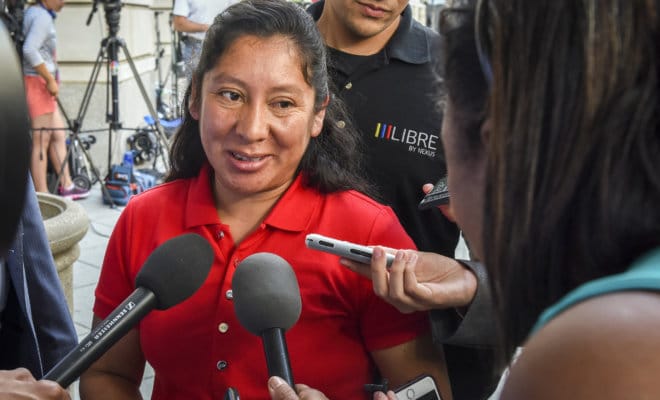Immigration
U.S. to Return Boy Taken at Border From Guatemalan Mom

Beata Mariana de Jesus Mejia-Mejia was to be reunited with her son on Thursday night. "All I want is to be with my son," she said.
Photo: Washington Post /Bill O'Leary
A 7-year-old Guatemalan boy was scheduled to be reunited Thursday night with his mother after they were detained and separated upon seeking asylum at the U.S. border, U.S. authorities told a federal judge in Washington.
The pledge by government lawyers – in a hearing challenging the Trump administration’s immigrant family separation process – came less than 24 hours after President Donald Trump on Wednesday issued an executive order discontinuing the policy, leaving confusion and a raft of legal questions in its wake.
Immigrant rights groups and 11 states, including Maryland, on Thursday announced their intentions to also challenge what they called the administration’s unconstitutional and discriminatory policy, after learning that detention centers across the country were holding children.
Trump’s executive order said the government would maintain a “zero tolerance” policy toward those who break the law. But it remains unclear whether or how the government plans to reunite more than 2,300 children already separated from their parents.
Beata Mariana de Jesus Mejia-Mejia, 38, said she had not seen her son, Darwin, for more than a month since they surrendered to Border Patrol agents after crossing from Mexico on May 19 near San Luis, Arizona. Her lawsuit in Washington alleged that the government violated constitutional guarantees of due process and deprived her of her child’s “care and custody” when she was separated from him.
Justice Department attorney Sarah Fabian asked U.S. District Judge Paul Friedman to wait to make any rulings in Mejia-Mejia’s case, saying her son would be released by 1:30 p.m. Pacific time Thursday and flown immediately from Phoenix to Washington to reunite with his mother.
The government agreed to give the court an update by noon Friday, and Friedman agreed to postpone further action until then.
Michael Donovan, whose company paid for Mejia-Mejia’s bond and lawsuit, told reporters that he hoped she and her son “give a face and a name to the thousands of mothers and fathers and children affected by this inhumane policy,” and that they “should be reunited now” to end a “dark and sad . . . chapter in American history.”
“We’re very, very happy, but you can’t ignore the absolute human crisis created by the separation in the first place,” said Donovan, chief executive of Libre by Nexus of Atlanta. He said the company would amend the lawsuit to a pro bono class-action case for other reunited families.
Speaking softly through an interpreter outside federal court Thursday, Mejia-Mejia said: “All I want is to be with my son. I want to see him. I appreciate very much the attorneys and all of their help. I want to be with my son; I want to see him again.”
How the reunification process would occur for the children already separated from parents was the key question raised by Mejia-Mejia’s lawsuit, as well as in a broader pending challenge by the American Civil Liberties Union. The ACLU has asked a federal judge in San Diego to impose a nationwide injunction and grant class-action status in a case that seeks to halt family separations and reunite children still separated.
U.S. District Judge Dana Sabraw of San Diego on June 6 denied a government request to dismiss that case and has set a hearing for Friday to discuss how the executive order affects that proceeding in action brought on behalf of a Congolese woman separated from her 6 year-old daughter and a Brazilian woman separated from her 14-year-old son.
In an interview, Lee Gelernt, deputy director of the ACLU Immigrants’ Rights Project, said that if Trump’s order “is going to stop all family separations in the future, then that part of the lawsuit may no longer go forward. But what the executive order does not address, and it’s a clear and critical omission, is the reunification of thousands of young children who are sitting by themselves and who have already been separated.”
Gelernt said, “That part of our lawsuit remains just as critical as before the executive order.”
Washington state Attorney General Bob Ferguson publicized an imminent plan to file a coalition-based lawsuit in the Western District of Washington, challenging the president’s separation policy. The suit will allege that the administration violated due process rights of both parents and children, and that it is a discriminatory policy that only targets people crossing the United States’ southern border.
Washington state officials began looking at a potential case against the policy last month, according to Ferguson, and speeded up its review when Ferguson learned that state detention centers were holding parents and children as young as 6.
“The president likes to dehumanize these folks,” Ferguson said Thursday.
Maryland Attorney General Brian Frosh, D, said his state plans to join the coalition in the suit. “We want to stop what’s going on immediately and do everything possible to reunite the children with their families,” Frosh said. He called the Trump administration’s actions “outrageous and inhumane” and lamented that the government appeared to have “lost track of some of the parents.”
For weeks, the Department of Health and Human Services had been moving hundreds of minors around the country, finding agencies that could house them.
Mejia-Mejia fled Guatemala seeking asylum in the United States after facing violence and death threats from her husband toward her and her son, her lawsuit stated.
Two days after turning themselves in to the Border Patrol agents, her son, who is named as “D.M.” in the complaint, was taken from her, the suit said. Mejia-Mejia was released from custody June 15 and has been staying with a friend in Austin as she awaits the next court hearing on her asylum petition, the suit said.
“Men dressed in green uniforms (border agents) told Ms. M. they needed to take her son and would not tell her why,” the lawsuit stated. “Ms. M. said ‘no’ and demanded an explanation, but they would not tell her why they needed to take her seven-year-old son, and they took him anyway. The border agents did not tell Ms. M. where they were taking her son. When D.M. was taken away from his mother, he was screaming and crying and did not want to be taken away from his mother. That was the last time Ms. M. saw her son.”
Mejia-Mejia’s attorney, Mario Williams of Atlanta, said government officials declined to provide papers about her son’s status or answer her repeated questions while she was in detention, other than an officer who told her that he was near Phoenix. Mejia-Mejia was detained at the federal Eloy Detention Center in Arizona.
Mejia-Mejia on Thursday told reporters she wanted to come to America to “fight for my son. I’m going to give him a good education, make a living,” she said. Asked whether she had any message for U.S. authorities, she said, “May God touch your heart.”
Mejia-Mejia was not charged criminally and so was not subject to the administration’s “zero tolerance” policy for illegal border crossers, her attorneys said, but they say her case showed border officials were separating families to deter asylum seekers.
(c) 2018, The Washington Post



